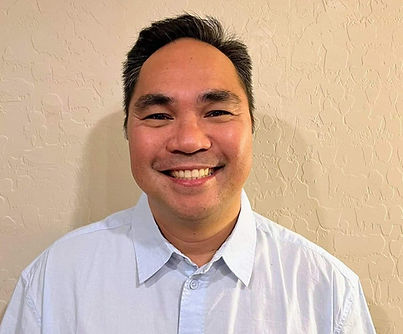Meet the Team
Arizona Professional Hospice Care is led by Stephen Tan, Leslie Ortiz, and Teresa Ortiz, a highly experienced team dedicated to providing top-quality, patient-centered hospice care. Stephen Tan, with 10 years of healthcare experience, oversees daily operations and compliance, ensuring excellence through his active participation in annual CMS Medicare conferences. Leslie Ortiz, with over 10 years of expertise in healthcare logistics and group home management, optimizes operational workflows and resource management for seamless patient care. Teresa Ortiz, a 15+ year healthcare veteran, brings extensive experience in caregiving, medication management, and group home operations, ensuring compassionate, high-quality care. Together, their leadership, expertise, and commitment to excellence drive Arizona Professional Hospice Care’s mission to serve patients and families with the highest standards of hospice care.

The Role of Hospice Staff
RN Case Manager/ Nurse
You will be assigned a primary care nurse who will coordinate your care and handle any nursing needs. The role of the nurse is to help prevent and relieve pain and other symptoms, and to teach caregivers ways to provide for your care. The nurse will also make certain that necessary medical supplies and equipment are ordered and will assist in monitoring medications. Regular communication with your physician will make certain that he/she is aware of your status and that orders are being followed.
Your hospice nurse will try to anticipate your needs and assist you to better understand the natural progression of your illness. With this information, you will be encouraged to make decisions regarding your care.
Your nurse will set up a regular visit schedule per your individual needs. He/she will be available and accessible from 8am-5pm, Monday through Friday. You can reach your nurse by calling hospice at (602) 490-8841 or unless a different number and visit times have been discussed.
Social Worker
Facing a serious illness can be a time of tremendous pain and confusion for you and your family because you must deal with emotions and challenges throughout this time in which the illness is occurring. A social worker may be assigned to help you and your family. Services that may be provided by the social worker include:
❖ Providing emotional support, counseling, and guidance, and to make sure that you and your family are coping with stress related to the illness.
❖ Identifying community resources which are available to help you.
❖ Assisting you and your family with planning for private hire caregiver, funeral arrangements.
❖ Offering information about Advanced Directives.
Spiritual Counseling
Hospice spiritual care is based on a high respect for the patient's and caregiver's personal faith and belief. The hospice spiritual counselor is available to assist patients and families cope with the significant spiritual issues that often arise during a terminal illness period up to and after death.
The services offered include regular spiritual care visits, being on-call, available for crisis, conducting funerals and memorial services as requested, and contacting your own clergy person or minister of your denomination of faith, on your behalf. The hospice spiritual counselor does not impose his/her personal belief systems or seek to change the beliefs of others.
Arizona Professional Hospice Care spiritual care team has received clinical training for this specialized form of ministry and will seek to provide the best spiritual support in a compassionate manner.
Their services are available to you and your family, if requested, for as long as needed while you are a hospice patient.
Hospice Aide
Hospice aide services are provided under the supervision of a registered nurse to patients whose primary caregivers are unable to assume full patient care due to physical or emotional limitations or when patients live alone and are unable to do the care for themselves.
The hospice aide assists with the patient's personal care which may include bathing, hair care, shaving, skin care, linen changes, catheter care, and straightening the patient's immediate surroundings. Hospice aides are not allowed to dispense medication.
The hospice aides are certified nursing assistants with hospice experience who will report any changes in the condition of the patient to the appropriate team member and the clinical director. All hospice aide visits are scheduled by the patient's convenience discussed between the CNA, nurse, and patient. Days and times may vary to meet patient needs.
Volunteers
A vital part of hospice is the carefully selected and well-trained volunteers working alongside the professional staff. These special people provide many different types of support for the hospice program and those coping with terminal illness, grief, and loss. They are good listeners, nonjudgmental, adaptable, and have a strong desire to reach out with love and concern to others. Volunteers may be used on a regular schedule or on as-needed basis.
To request the assistance of a volunteer, ask any team member or call the hospice at (602) 490-8841 and ask for the Volunteer Coordinator.
Bereavement
Bereavement services are an integral part of the hospice program. Following a terminal diagnosis, patients and families often struggle with anticipatory grief issues. The medical social worker and chaplain are available to assist families during this emotionally difficult time, as well as provide information on common aspects of anticipatory grief. Following a hospice patient's death, Hospice continues to provide bereavement support to grieving families. While one individual is identified as the primary contact with the family, generally the spouse or primary caregiver, all members of the family are eligible to receive bereavement services.
These services are available for at least a year following the patient's death. They include periodic mailings to provide support and education regarding grief issues, a grief support group, phone contacts and individual visits ( as desired by the bereaved family) by the bereavement coordinator, medical social worker, or chaplain, to assess bereavement coping skills and provide emotional support.
For needs that exceed the scope of hospice bereavement services, referrals to other organizations and professionals within the community are available. These services are also made available to anyone in the community in which hospice services are provided.




